Table of Contents
If you’ve got unruly, thick, tangle-prone hair, skipping the conditioner isn’t really an option, however cost-saving and eco-friendly that might be. I fall into that category and am quite fussy about my shampoo and conditioner.
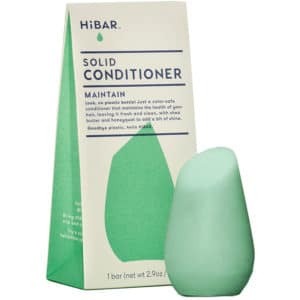
Our top organic conditioner
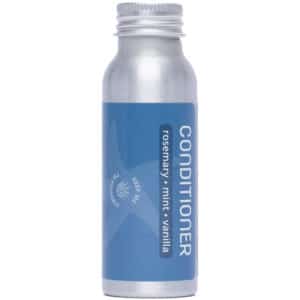
Travel-sized option
Conditioner ingredients: what to avoid
Most folks use shampoo and conditioner at least once a week, if not more frequently. And while it takes just a few minutes to wash and condition your hair, this still amounts to thousands of hours of exposure to the plethora of chemicals in those products.
One good rule of thumb, and a great time-saver, is to only choose products that list all their ingredients and that contain only ingredients you can recognize easily, i.e., without need of a biochemistry degree.
Another pro tip is to be skeptical of branding that makes a big deal about certain ingredients, such as aloe or biotin, only to list these at the very end of the ingredients label after a raft of confusingly named chemicals. In most cases, it’s the first five or so ingredients that really matter. If these are toxic, no amount of aloe will save the day.
So, what are the ingredients to watch out for in conditioner? Here are a few it’s best to avoid:
- Harsh sulphates such as sodium laureth and sodium lauryl sulphate (SLES and SLS)
- Parabens
- Phthalates
- PEGs (such as PEG-150 distearate)
- Ingredients with “xynol,” “ceteareth,” and “oleth” in their name
- ‘Fragrance/parfum’
- Palm oil – devastating to natural ecosystems and wildlife habit and a major contributor to climate change through deforestation
- Dipalmitoylethyl hydroxyethylmonium methosulfate
- Triclosan
- Butylate hydroxytoluene (BHT) and butylated hydroxyanisole (BHA) – these are closely related synthetic antioxidants commonly used as preservatives in conditioner and shampoos.
- Behenamidopropyl dimethylamine
- Triethanolamine (TEA), diethanolamine (DEA) and monoethanolamine (MEA)
- Cocamide DEA – classified by the Danish Environmental Protection Agency as hazardous to the environment, it is acutely toxic to aquatic organisms and has the potential for bioaccumulation (R).
- Dimethicone (also known as polymethylsiloxane)
- Siloxanes: cyclotetrasiloxane (D4) and cylcopentasiloxane (D5) – recognized as toxic and persistent, with the potential to bioaccumulate in aquatic organisms (R, R).
These are some of the more common culprits in conditioners, but if you’re curious about other chemicals on the label, consider searching the European Commission’s Cosmetics Database. Those listed in the banned or restricted categories (Annex II and Annex III) are best avoided, even if these chemicals are not banned or restricted in the US.
Finally, if you’re vegan or observing Halal or Kosher practices, watch out for keratin in conditioners. This protein is often derived from pigs or cows.
The best non-toxic conditioners
So, without further ado, here are some of the best eco-friendly, organic conditioners available, many with minimal packaging, zero toxic chemicals, and offering some serious hair nourishment.
After you’ve found a good conditioner you like, make sure to check out our top organic shampoo options too!
And, as a bonus for the true eco-nerds, if you want to know more about which chemicals to watch out for in conditioner, scroll to the end for a quick reference list.

Maintain HiBAR Conditioner Bar
Highlights: Made with plant-based ingredients that are free from parabens, sulfates, silicones, gluten, palm oil, and phalates while lasting as long as a 16 oz bottle.
HiBAR shampoo and conditioner bars are a great choice for eco-friendly hair care. They’re not tested on animals and are free from parabens, sulfates, silicones, gluten, palm oil, and phthalates. The bars are made with plant-based ingredients including nourishing coconut oil, shea butter, and essential oils, and are totally plastic-free.
Looking at the ingredients list for this one, you might well worry over the presence of behnetrimonium methosulfate. While a mouthful, this chemical is actually naturally derived and non-toxic, unlike the similar sounding behentrimonium chloride (which should be avoided). BTM is non-irritating (it can actually soothe the scalp!) and doesn’t cause build-up, and it’s a great addition to natural conditioners.
HiBAR conditioner bars last at least as long as a 16 oz bottle of conditioner but take up much less space and are far easier to ship, meaning fewer associated carbon emissions. It’s best to let the bar dry fully between uses to make sure it lasts a good while. When you are done with it though, HiBAR conditioner bars are biodegradable and there’s no pesky plastic to throw out or recycle.
These bars are packaged with compostable or recyclable packaging and are shipped in recycled and recyclable packaging. They’re color-safe and help hair stay clean, fresh, heathy, and tangle-free! Looking for a volumizing conditioner? They have one of those too! (View on EarthHero).
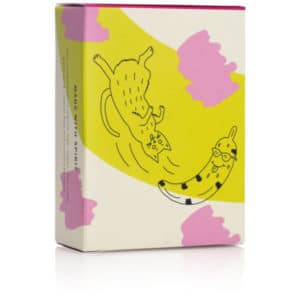
Meow Meow Tweet! Lavender Hemp Conditioner Bar
Highlights: Cruelty-free and zero waste conditioner bars made in small batches using organic and fair trade ingredients.
Made in the USA, these Leaping Bunny certified Cruelty-Free, zero-waste conditioner bars by Meow Meow Tweet! are the perfect complement to the company’s shampoo bars. The ultra-nourishing Lavender and Hemp bar is made with plant butters and hemp oil, with natural ylang ylang and lavender for a chilled-out hair treatment.
Made in small batches using organic and fair trade ingredients, these vegan conditioner bars are totally plastic-free and come in a compostable or recyclable paper box with a compostable inner paper lining. They’re also free from gluten and palm oil.

Plaine Products Refillable Travel Size Vegan Conditioner
Highlights: Offered in a refillable recycled and recyclable aluminum bottle as a travel-friendly option.
Plaine Products offers both shampoo and conditioner in refillable recycled and recyclable aluminum bottles in both a regular and travel size option. What’s inside is vegan-friendly, organic, biodegradable, color-safe, and cruelty-free, with no sulfates, parabens, phthalates, PEG, synthetic fragrances, palm oil, or GMOs. Key ingredients include organic aloe, shea butter, and bilberry and olive extracts.
Totally plastic-free, BPA-free, and PVC-free, these bottles can be sent back to Plaine Products to be refilled and reused, or you can just recycle the bottle at your local depot or curbside, depending on where you live. Both the product and the bottles are made in the USA, helping to keep the environmental footprint small.
Plaine Products conditioner is also hypoallergenic and ‘no tears’, i.e., baby-safe. It’s great for all hair types (even tangled messes) and helps support shiny, smooth hair that’s easier to wrangle into a manageable style.
Plaine Products is also a certified B Corp and member of 1% for the Planet, with all products certified Cruelty-Free by Leaping Bunny. The company is diligent about the ingredients used, running everything through the Environmental Working Group’s database to be sure their formulas are safe and non-toxic.
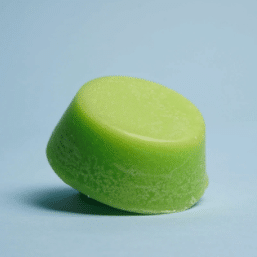
etee Hair Conditioner Bar
Highlights: One 60g bar packs inside it the equivalent of 3-4 standard-sized bottles of conditioner while being entirely plant-based to boot.
etee’s Conditioner Bar packs in the equivalent of 3-4 bottles of conditioner in one 60 g bar and is plastic-free, 100% plant-based, and not tested on animals. A decent choice for hair that’s thick and curly hair to totally straight hair, this conditioner went through several rounds of development to make it just as high-performing as a liquid conditioner.
Ingredients include shea butter, coconut oil, and essential oils, alongside a few things I’d rather weren’t in this formula. One example is dipalmitoylethyl hydroxyethylmonium methosulfate, which is a quaternary ammonium salt that can trigger allergies and sensitivities. Behenamidopropyl dimethylamine can also be an issue, especially if left on the skin. So, be sure to rinse this product well.
The conditioner bar is made in Canada and is free from SLS, parabens, phthalates, sulfates, synthetic fragrances, and synthetic preservatives.
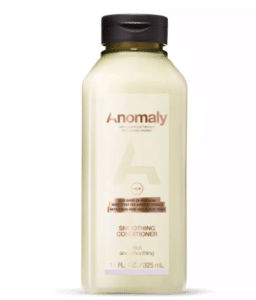
Anomaly Conditioner
Highlights: Affordable option that’s readily available and easy to find in Target stores within the US, but still has some work to do to catch up to organic and eco-friendly competitors.
Exclusively available at Target in the US, Anomaly is a new line of vegan hair care products designed by the actress Priyanka Chopra Jonas. This range is clearly intended to carve out a more eco-friendly, clean niche in the celebrity hair care world and while far from perfect, the products are likely to shine a light on the wasteful and rather toxic status quo.
There are three conditioners available – volumizing, smoothing, and shine, as well as a deep conditioning treatment mask and four shampoos. All of the products are super affordable at just $5.99, which is also rare for a celebrity-created line.
So, why mention Anomaly? In part because Chopra Jonas has done a decent job of keeping some of the worst chemicals found in most hair care out of her products. These include sulfates, parabens, phthalates, triclosan, butylate hydroxytoluene (BHT), and many others. As I said, Anomaly is not perfect, with some concerning chemicals present, including PEG-150 distearate (which can be contaminated with 1,4-dioxane and ethylene oxide). The products also feature ‘fragrance’ – that irksome catch-all for any chemicals a company would rather keep off the ingredients list.
One major plus of this line, though, is that the product bottles are made with far thinner plastic than typical hair care products and the plastic is, at least in part, recycled. Anomaly isn’t super transparent about how much recycled material is in each bottle, but they get some marks for effort at least.
Final thoughts
Switching up your shampoo and conditioner, as well as shaving products, nail polish, and other toiletries, might seem like small, inconsequential changes, but the truth is that these changes can make a big difference. The environmental impact of the products we use every day, or several times a week at least, can quickly mount up.
Finding an eco-friendly, non-toxic alternative that works just as well, if not better, can dramatically cut your carbon emissions and minimize your exposure to nasty chemicals that can harm your health. And by choosing recycled and recyclable packaging or, better yet, plastic-free packaging, can help keep plastic waste out of landfills and waterways.